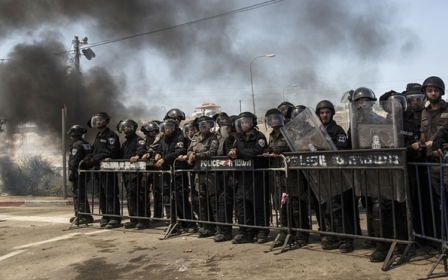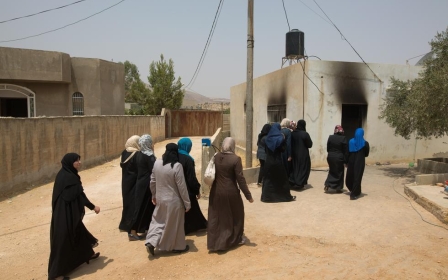Hackers target dozens of Israeli websites over release of arson suspects

Hackers targeted 54 websites run by the Israeli government on Tuesday, in an apparent revenge attack for a firebombing that killed a Palestinian toddler and his father.
The hacking group Anonymous, a loose network of affiliated computer hackers, said in a statement that it had targeted Israeli government sites after authorities on Monday released all suspects who had been detained in relation to the murders.
Eighteen-month-old Ali Dawabsha died on 31 July after the family’s home near the West Bank town of Nablus was set alight by attackers believed to be Israeli settlers.
His father, Saad Dawabsha, died on Saturday of his injuries, while his wife, Reham, and older son, Ahmad, remain in hospital in critical condition.
Immediately after the attack, Israeli Prime Minister Benjamin Netanyahu promised a “zero tolerance” policy to pursue the perpetrators, amid allegations that Israeli authorities fail to do enough to prevent settler violence, often known as “price tag” attacks.
Israeli human rights group Yesh Din found last year that the conviction rate for crimes committed by Israeli civilians against Palestinians in the West Bank remains at just 1.9 percent, despite the establishment of a police team dedicated to investigating settler violence.
In the wake of the deadly arson, in which the attackers spray-painted the words “revenge” and “Long live the Messiah” on the walls of the family home, Israeli authorities have been under pressure to stamp out settler violence.
Nine people were reportedly arrested in connection with the attack, but were all released on Monday according to the Israeli security services, Shin Bet.
At least one of the suspects was held under administrative detention, a controversial system usually reserved for Palestinians that allows people to be incarcerated without trial for renewable six-month periods.
Anonymous said on Tuesday that their hacking attack was a response to the decision by the “criminal state” to release the suspects.
Websites targeted included that of the Prime Minister’s office, the Israeli Defence Forces, the Foreign Affairs Ministry and the Ministry of Finance.
Most websites were inaccessible for around nine hours, with some still experiencing technical problems at the time of publication, nearly 12 hours after the attack was staged.
Middle East Eye propose une couverture et une analyse indépendantes et incomparables du Moyen-Orient, de l’Afrique du Nord et d’autres régions du monde. Pour en savoir plus sur la reprise de ce contenu et les frais qui s’appliquent, veuillez remplir ce formulaire [en anglais]. Pour en savoir plus sur MEE, cliquez ici [en anglais].




